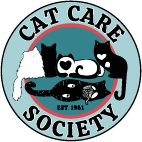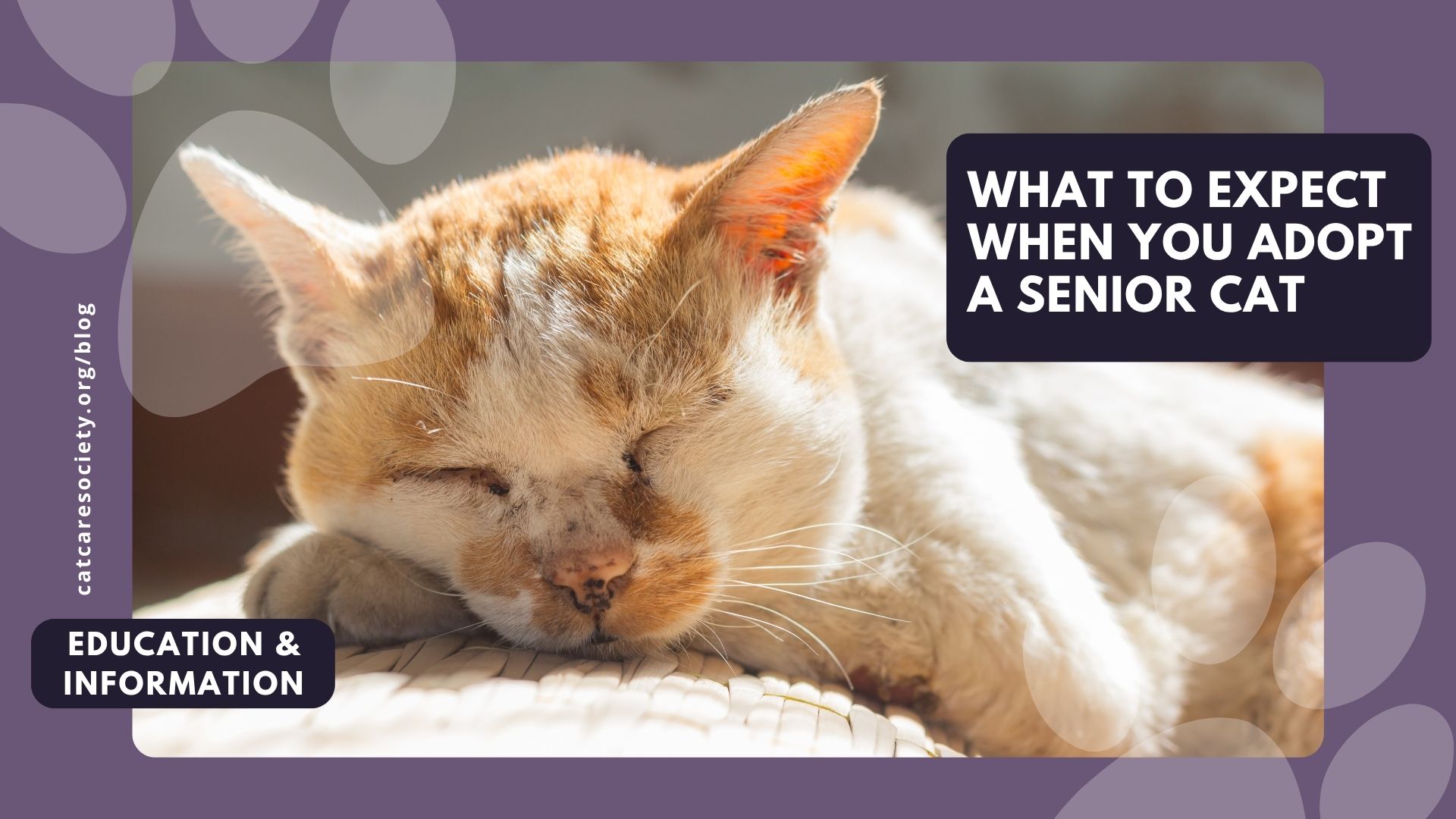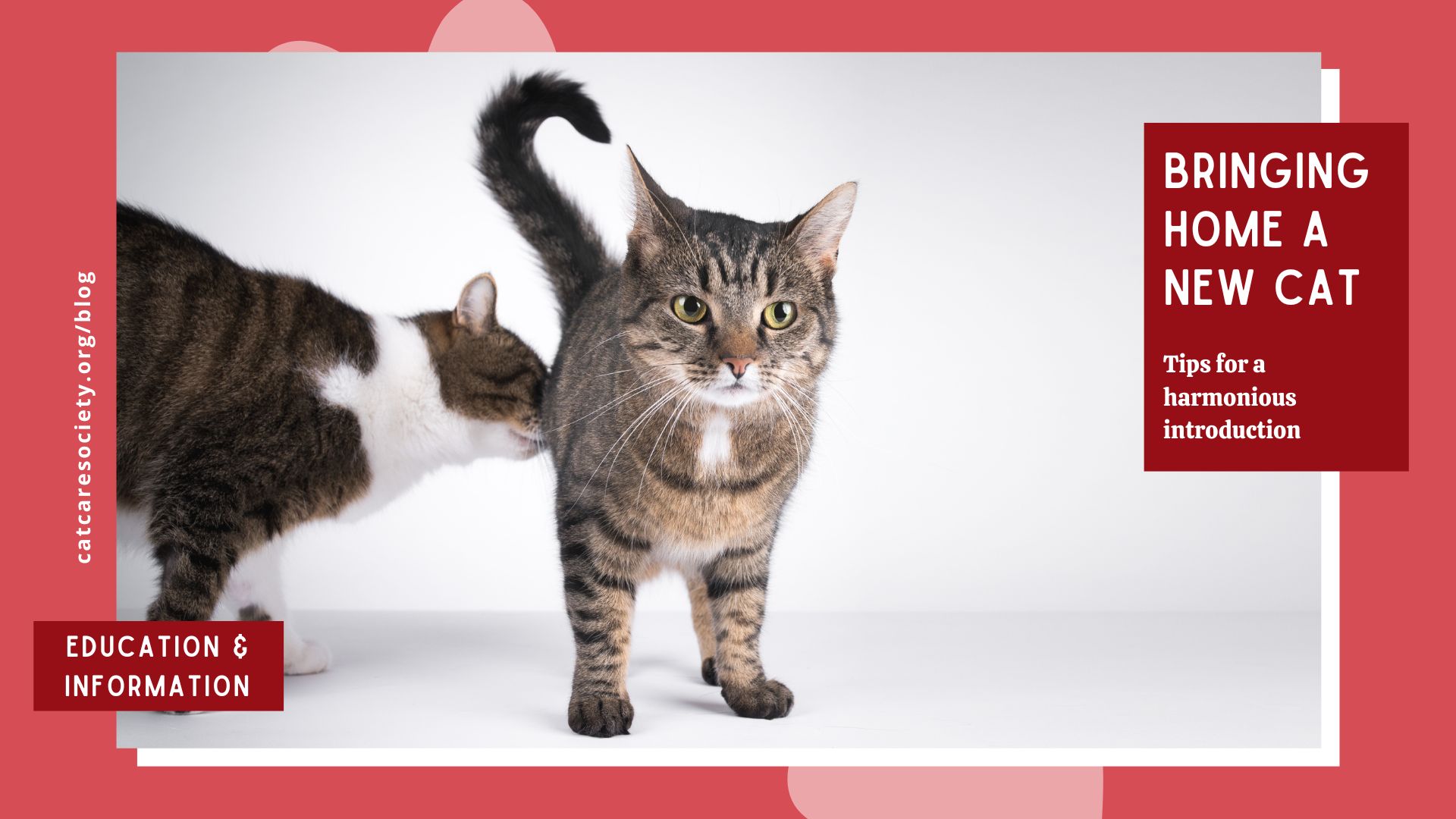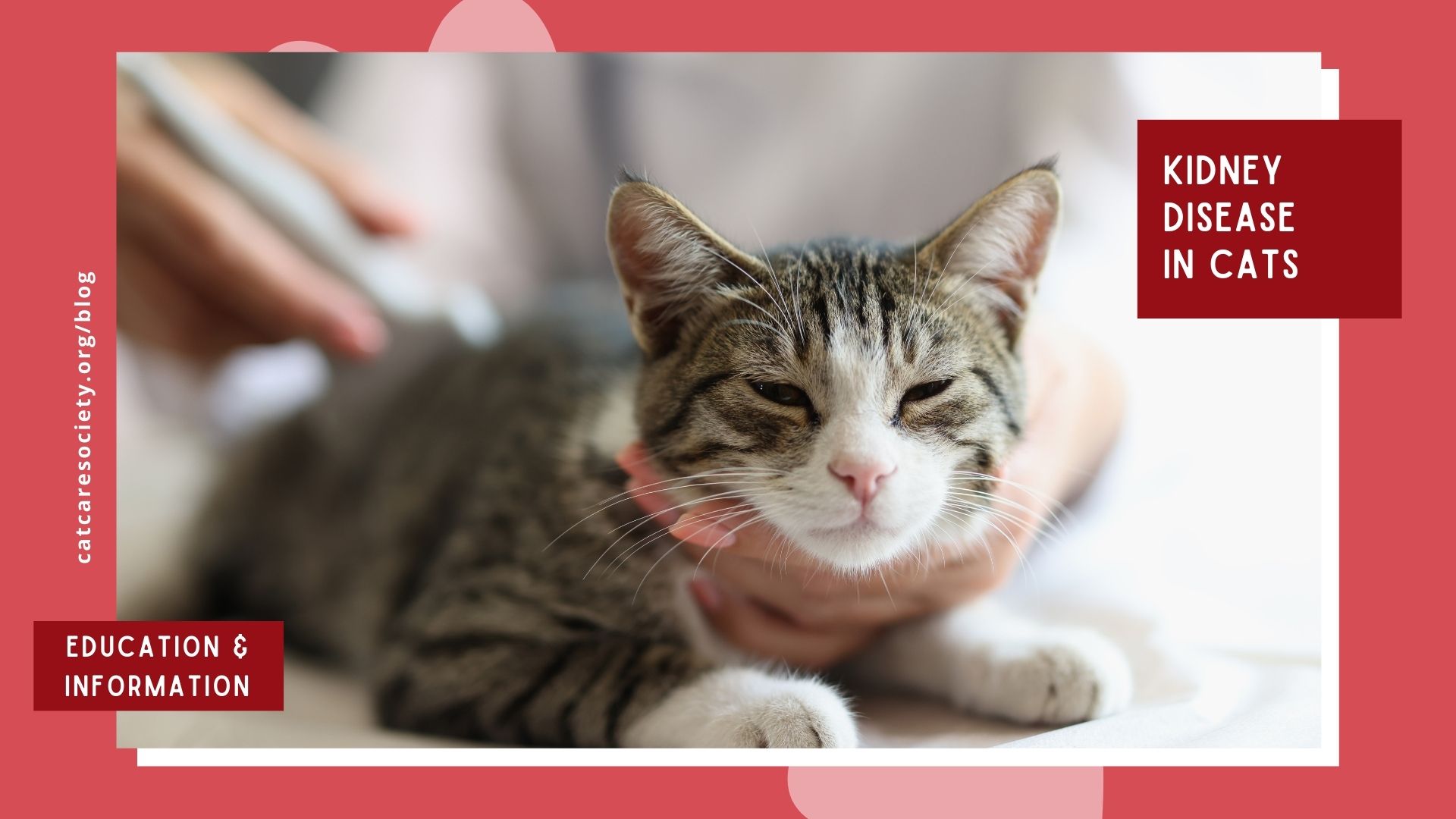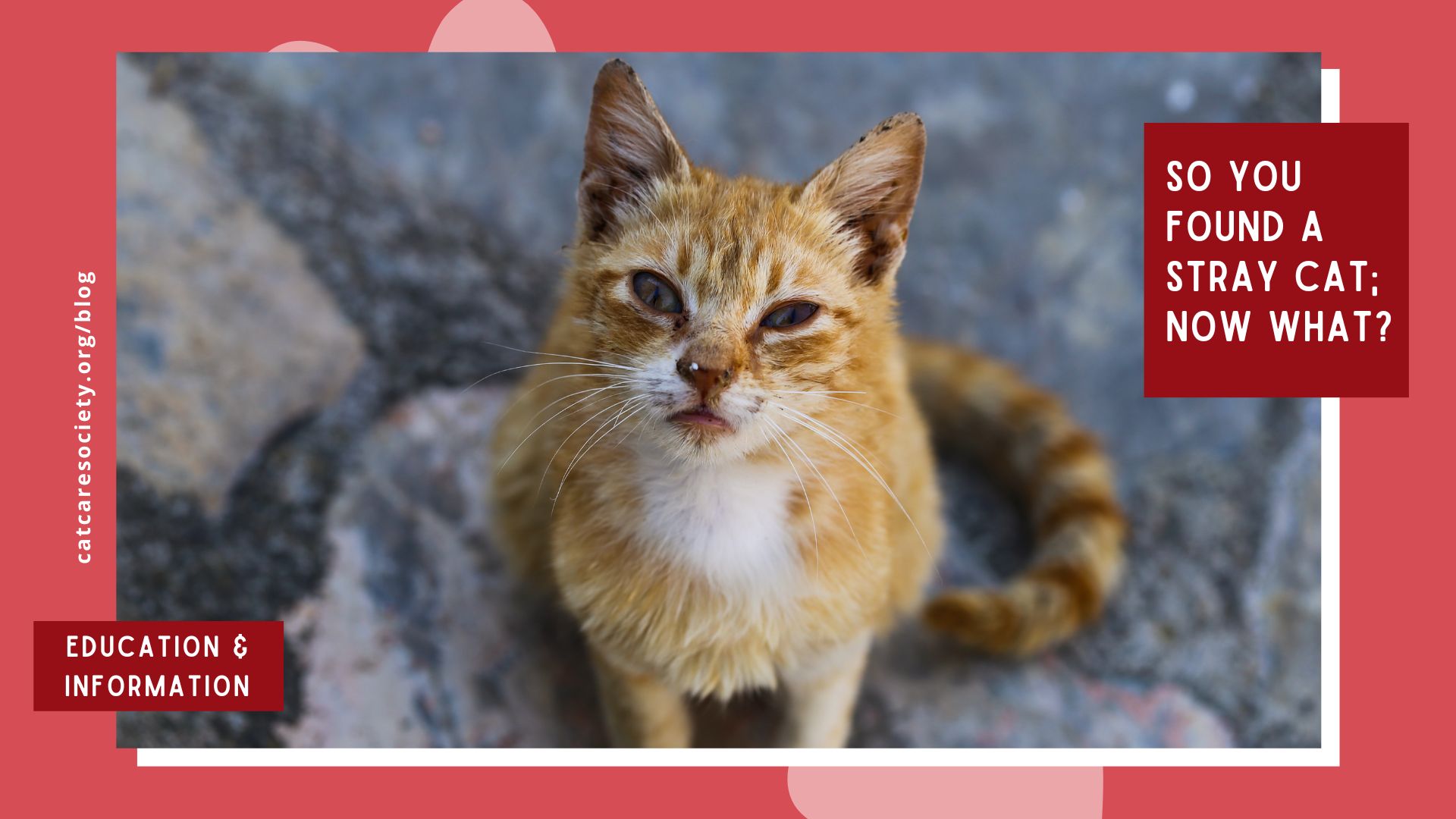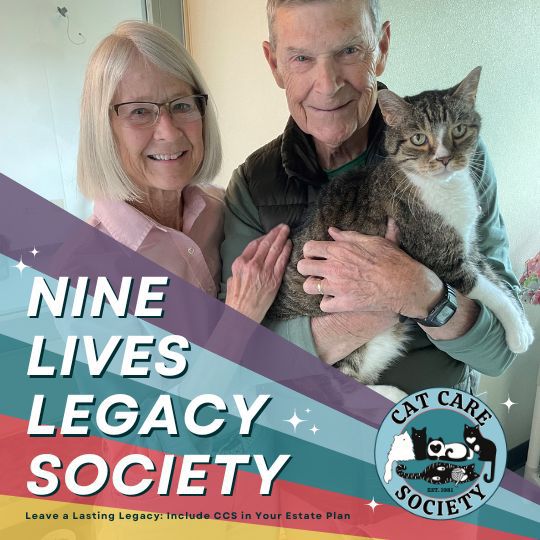Introduction
Cat Care Society believes that all cats are worthy, regardless of their age or abilities. Senior cats, in particular, hold an extra special place in our hearts—and it’s not just us! Time and again, we hear from adopters who submit successful adoption updates that feel the same way. Senior cats are sometimes overlooked in shelters, but those who choose to adopt them often say it’s extremely rewarding and they’re amazed at the quick and deep connections they make.
While every senior cat is unique and has their own personality, there are some common things you can expect and prepare for when you adopt a senior cat, which we’ll share later in this article.
But First, What Is a Senior Cat?
Unlike humans, cats don’t start receiving AARP letters in the mail to let them know they’re considered a senior, but they do often show their age in subtle ways, through their physical health and behavior. Cats typically enter the senior category at age 10, which is when their nutritional and wellness needs begin to shift. However, some veterinarians begin senior wellness exams as early as age seven to help catch potential health concerns early.
Like humans, cats can age prematurely due to lifestyle factors such as lack of nutrition, trauma or injury, and lack of preventative veterinary care. When a cat’s history is unknown—as is often the case with strays and other cats seen in shelters—veterinarians rely on indicators such as the condition of their teeth, skin, coat, eyes, and mobility to estimate age.
What You Can Expect When You Adopt A Senior Cat
Below are some common, but often unexpected, traits and tips from senior cat households.
- Expect a Mellow and Appreciative Companion: Yes, senior cats often sleep more, but they’re also wise and experienced, and therefore less curious and mischievous than their younger counterparts. Not only will you be waking up less to the midnight zoomies and other cute but chaotic kitten energy, your new senior friend will likely be more than happy to curl up in your lap or nearby to keep you company while you work or relax.
Because older cats have lived longer and likely experienced highs and lows, they recognize when they’ve got it good! When you bring a senior cat into your home and provide them with a cozy bed, stable routine, and tasty food, they are more than happy to show their gratitude and appreciation. Whether it’s slow blinks, sweet head bumps, or deep purring, senior cats have their own gentle ways of expressing love and appreciation.
- Expect a Senior Cat to Need Little Training, Just Some Time to Adjust: Most senior cats have lived in a home before; they understand household routines and are usually litter box trained, making the transition to their new home life easier. Some senior cats may need a little extra time to feel like themselves again after shelter life, and your patience goes a long way. With less training required, there’s more time to focus on bonding, which can help them adjust.
- Expect Specific Mealtime Needs: As cats age, they require different nutrient profiles to thrive. Healthy senior cats often do well with senior-formulated dry and wet foods, which are typically higher in protein and lower in calories and fat. They may also be enriched with supplements like antioxidants and glucosamine for joint health. Additionally, as cats get older, they may develop health conditions that require specially formulated and prescription food, such as for kidney support and diabetes.
Along with a special diet, senior cats may require ongoing medication, depending on the health condition. Fortunately, just like other habits, such as always escorting you to the bathroom or meowing loudly if their mealtime is even one minute late, cats can also get into the routine of taking their medicine. When you adopt a cat with a health condition from Cat Care Society, you’ll receive guidance on what foods and treats may be most appropriate for your new cat, as well as instructions on how to administer any required medication to set you both up for success. For cats requiring specialized ongoing care, we may have you meet with our veterinary team before completing the adoption to ensure you understand your new pet’s medical needs, feel confident transitioning them to your home, and have all the information you need to continue care with your preferred veterinarian.
- Expect to Plan Ahead with Pet Insurance: If you are planning on getting pet insurance, be sure to get it as soon as you adopt a senior cat. This will help ensure that any health conditions that arise will be covered, as most pre-existing conditions are not. Read more in our pet insurance blog article.
- Expect Your Senior Cat to Embrace Play, Puzzles, and Peaceful Moments: Senior cats still enjoy and benefit from play and enrichment; they might just have shorter endurance and be a bit more selective in how and when they participate. Puzzle feeders and other food- and treat-dispensing toys offer mental stimulation. Opportunities to climb and gentle play with wands and crinkle toys provide physical enrichment, and creating intentional warm and sunny spots as well as places to hide and recharge support emotional wellbeing.
Closing
Opening your home to a senior cat means offering love, comfort, and stability when they need and appreciate it the most. Plus, the bond and companionship you’ll share can be incredibly rewarding.
At Cat Care Society, we know how special older cats are, and we’re here to support you every step of the way. Whether you’re a first-time adopter or an experienced cat parent, we invite you to consider the joy of bringing home a senior cat.
Please note that the traits we’ve shared are common among senior cats, but not guaranteed. Your new feline friend may have their own quirks and needs based on their personality and life experiences.
When browsing our cats available for adoption, you can filter by age group (see image below) to easily find your perfect senior friend. Many of our older cats are members of our Lonely Hearts Club, a group of special cats chosen by CCS staff to spotlight those who have been overlooked in the past, despite their potential to thrive in the right home. No matter their past experiences, a senior cat’s next chapter with you could be the most meaningful.
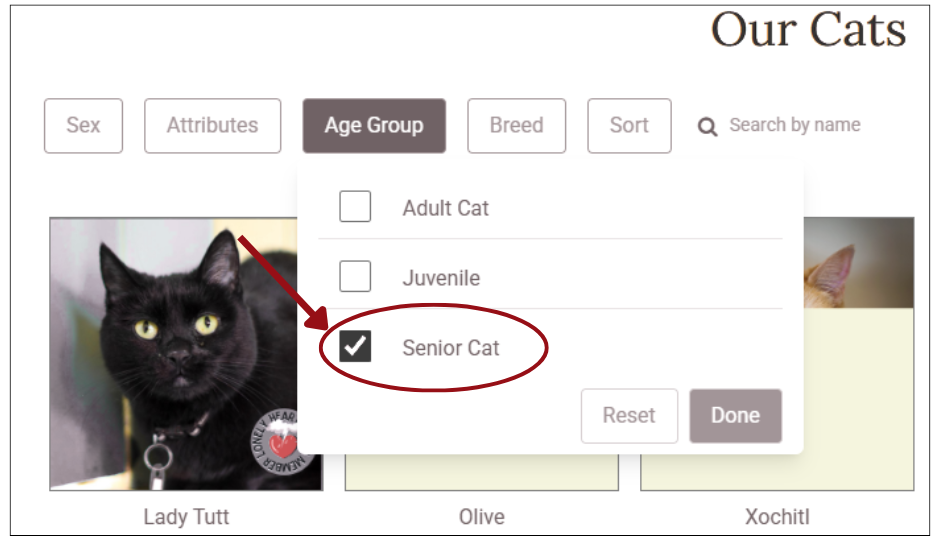
About the Author: Beth Dokolasa is a volunteer for Cat Care Society and serves on the Board of Directors. She is an instructional developer for Natural Grocers and lives in Indian Hills, Colo., with her husband, daughter, and two cats, Techno and Digit.
